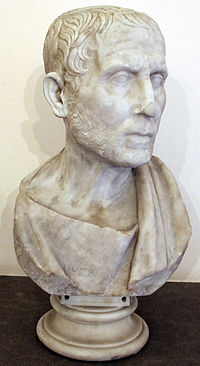Poseidonius
| Posidonius | |
|---|---|

Bust of Posidonius from the Naples National Archaeological Museum
|
|
| Born | c. 135 BCE Apamea |
| Died | c. 51 BCE Rhodes or Rome |
| Era | Ancient philosophy |
| Region | Western Philosophy |
| School | Stoicism |
|
Main interests
|
Astronomy, Geography, History, Mathematics, Meteorology, Philosophy, Physics |
|
Influences
|
|
|
Influenced
|
|
Posidonius (Greek: Ποσειδώνιος, Poseidonios, meaning "of Poseidon") "of Apameia" (ὁ Ἀπαμεύς) or "of Rhodes" (ὁ Ῥόδιος) (c. 135 BCE – c. 51 BCE), was a GreekStoicphilosopher, politician, astronomer, geographer, historian and teacher native to Apamea, Syria.
He was acclaimed as the greatest polymath of his age. His vast body of work exists today only in fragments.
Writers such as Strabo and Seneca provide most of the information, from history, about his life.
Posidonius, nicknamed "the Athlete", was born to a Greek family in Apamea, a Hellenistic city on the river Orontes in northern Syria.
Posidonius completed his higher education in Athens, where he was a student of the aged Panaetius, the head of the Stoic school. But soon he came in conflict with the Stoic doctrines and was involved in heated debates with many other Stoic philosophers of the school. The incidents concerning Posidonius's conflict and final break up with the Stoics are mentioned by Galen in his book On the Doctrines of Plato and Hippocrates. Eventually Posidonius gave up Stoicism and turned to a different philosophical direction, this of Plato but mainly of Aristotle, remaining a faithful follower of Aristotelian doctrines until his death.
...
Wikipedia
